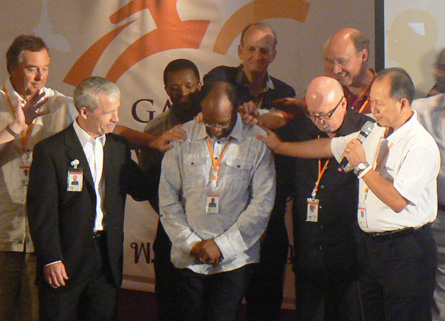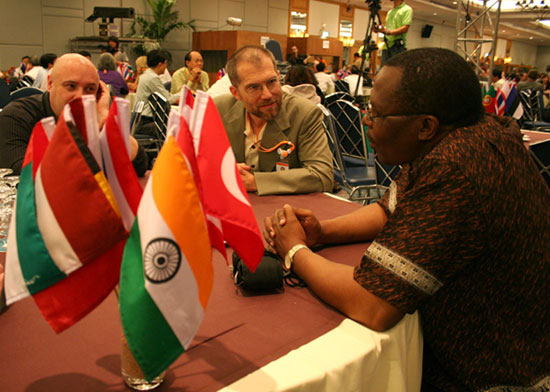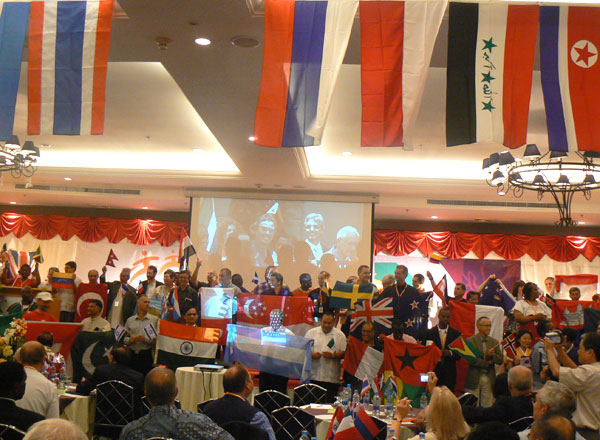PATTAYA, Thailand – In a world where secularism and mysticism are the new religion, the Christian faith must always challenge rather than be challenged by other faiths, world views and ideologies, says the head of the Asia Evangelical Alliance.
Addressing the World Evangelical Alliance General Assembly in Pattaya, Thailand, on Monday, the Rev. Dr. Richard Howell said that belief in the supreme, universal and trans-cultural Triune God and an identity rooted in the Gospel of Jesus Christ were evangelical non-negotiables in an age of pluralism.
“We have but one agenda – obedience to the Triune God revealed in Jesus Christ,” said Howell.
“Our identity has to be related back to God,” he added. “Unless we do that, we will never know who we are. Our identity comes from God and God alone.”
During his address, Howell spoke at length on the trans-cultural nature of God.
“The Christian belief in the oneness of God implies God’s universality, and the universality implies transcendence with respect to any given culture,” said Howell, who also leads the Evangelical Fellowship of India.
“Christians can never be first of all Asians, Africans, Europeans, Americans, Australians and then Christians,” he said.
The Christian identity was first and foremost connected to Christ, Howell emphasized.
Since Saturday, more than 500 evangelical Christians from over 100 nations have gathered for the World Evangelical Alliance General Assembly in Thailand – the first Assembly in seven years.
This year’s general assembly boasts a diverse array of organizations and denominational church bodies that include representatives of Pentecostal World Fellowship, the Mennonite community, World Alliance of Reformed Churches, the Charismatic stream, the China Christian Council, and historic mainline Churches.
Other organizations represented at the WEA General Assembly include Campus Crusade for Christ, Lausanne Committee for World Evangelization, and U.S. Center for World Mission, among many others.
During the weeklong gathering, participants will help form a new shared vision for WEA and a 5-year roadmap to achieve the vision. They will also be informed about some of the most pressing global issues and the Evangelical responses to them, receive practical training to help national alliances become more effective, and network to build a stronger Christian body.
In his address Monday, Howell, who was appointed head of the Evangelical Fellowship of Asia earlier this year, urged evangelicals to follow the example of Jesus’ first disciples and leave behind the cultural contexts they are found in.
“When disciples respond to God’s call, it necessitates a reordering of an entire network of commitments … indeed a whole new reordering of relationships,” he said. “Leaving is part and parcel of Christian identity.”
And while the secular world promotes individual identity, Howell said the Christian identity is affirmed through relationships in the body of Christ.
“Only in Christ can people be given that new identity as sons and daughters of God the Father,” he proclaimed.
“Identity cannot be provided by relief, welfare, or development projects. Identity is provided by the Gospel,” Howell added.
In closing, the evangelical leader reminded assembly attendees that believers choose to be salt and light of the culture they dwell in.
“Churches in mission must seek to transform and enrich all cultures for the glory of God thereby fulfilling their mandate to be the salt and light of the world,” he said.
Howell concluded with a reminder to evangelicals that the fundamental purpose of the Church is to proclaim Christ above all others.
“The Church is called to invite people to acknowledge the lordship of Christ personally and not privately. This requires accepting the lordship of Christ over total life, personal as well as social,” he exhorted.
“The lordship of Christ relates personal conversion and social responsibility. The church is a sign and a signpost of the Kingdom of God,” he said.
The World Evangelical Alliance, which will conclude its general assembly Thursday, is a global network of churches in 128 nations and more than 100 international organizations joined together to give a worldwide identity, voice and platform to more than 420 million evangelical Christians. The alliance is often involved in speaking on behalf of persecuted Christians as well as social justice issues including Darfur, poverty and other human rights issues.

















